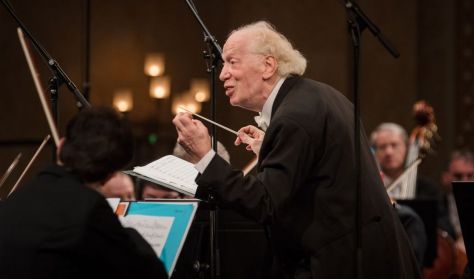
Swansong Kobayashi season ticket / 2
Gustav Mahler: Symphony No. 9 in D major

Gustav Mahler: Symphony No. 9 in D major
Ön egy múltbeli eseményre keresett rá. Kérjük, válogasson aktuális kínálatunkból a Jegy.hu keresőjében!
Last event date: Thursday, January 13 2022 7:30PM
Thursday, 13 January 2022, 7.30 pm
Approx. until 8.50 pm
Müpa Budapest – Béla Bartók National Concert Hall
Kobayashi season ticket / 2
Swansong
Gustav Mahler: Symphony No. 9 in D major
Hungarian National Philharmonic Orchestra
Conductor: János Kovács
After Beethoven’s Ninth Symphony, various composers developed a phobia of the number nine. They feared that, just like the immortal master of the First Viennese School, after completing their own ninth symphony, they too would never write a tenth. Mahler was no different: after his Symphony No. 8, instead of the number nine he gave his next symphony a title: Das Lied von der Erde. Much relaxed, he could then begin work on what was recorded as his Ninth, yet fate was ever vigilant – it would be Mahler’s final symphony, and he would only succeed in writing the first movement of the Tenth.
Mahler composed Symphony No. 9 in 1908/09. Though this symphony brings a period in music history to a close, as you listen to the work you can also detect the stirrings of a new era and the identification of new paths that Mahler would never have the chance to fully explore. It has the four movements of a classical symphony, yet is of epic duration, ranging from around 75 to 90 minutes in length. The order of the movements deviates entirely from a traditional symphony, with the composition opening and closing with a slow movement. The second and third movements are given the names Ländler and Rondo-Burleske. Another unusual feature is that though the work officially is in the key of D major, in reality the tonal scheme changes time and again, with the closing movement, for example, in D-flat major. Some see the work as a farewell to the world, while others emphasise its affirmaton of life. It is safe to say that the Ninth is a complex, mysterious work that always offers the listener new discoveries. As Herbert von Karajan described it: “It is music coming from another world, it is coming from eternity.” The conductor for the concert, the 70-year-old János Kovács, graduated from the Liszt Academy in 1973. He is a demanding artist of exceptional knowledge and ability, at home in a range of styles and genres and always a true pleasure for any orchestra to work alongside.
As in previous years, the 2025/2026 Ferencsik season ticket is aimed primarily at lovers of the Viennese classics. Once again…
Mozart’s Kyrie in D minor is a rarity, as is the incidental music to Thamos, King in Egypt, from which…
Concert-format opera performance in three acts, with one intermission, in Russian
item(s) in basket
total:
Time limit has expired. Please, put item(s) in to basket again.